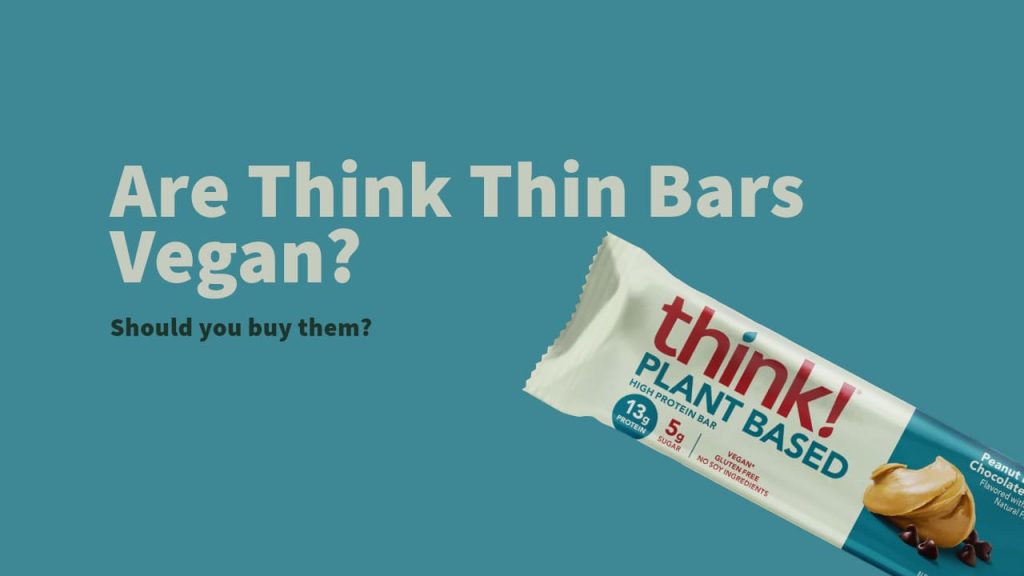If you’ve ever searched for a healthy snack, you’ve probably come across Think Thin protein bars. Think Thin was founded by entrepreneur Lizanne Falsetto with the mission of creating healthy, delicious snacks. But for those who live a vegan lifestyle, the question on everyone’s mind is: Are Think Thin bars vegan? Let’s find out.

Think Thin Bars: Two Main Categories
Think Thin has two primary lines of protein bars: High Protein Bars and Vegan High Protein Bars. While the company boasts about using non-GMO ingredients and refraining from artificial sweeteners like sucralose and aspartame, everything they sell is not vegan.
But,You may still already be asking, “Are Think thin bars vegan?”
Well, the bars exist in two main categories:
- Think High Protein Bars: These bars are not vegan as they contain animal-derived ingredients such as milk fat, calcium, and sodium caseinate.
- Think Vegan High Protein Bars: As the name suggests, these bars are plant-based, using protein sources like peas, brown rice, and pumpkin. They’re free from milk fats and caseinate, making them suitable for vegans.
Read Also:
- Are Gardettos Vegan? The One Reason Why They Are Not!
- [Updated: July 2021] Are Oreos Vegan In 2021? Here Is Why They Are Not!
- Are Doritos Vegan In 2021? A Complete Analysis.
Are Think Thin Bars Truly Vegan?
To answer this, we’ll analyze both categories in detail, examining their ingredients, environmental impact, and ethical implications.
1. Think High Protein Bars: Environmental and Ethical Concerns
Environmental Impact
The manufacture of milk-derived ingredients in Think Thin High Protein Bars is environmentally intensive.
Dairy farming calls for extensive tracts of land, which often results in deforestation and habitat loss. Moreover, cattle rearing necessitates extensive feed crops, draining further land resources.
An excessive amount of crops is needed to produce one liter of milk, which is unsustainable.
Impact on Animals
The dairy industry is famous for the treatment of animals. Cows are typically raised in substandard conditions, mistreated, and separated from their calves.
Male calves are typically culled, and dairy cows are eventually slaughtered. Additives like calcium and sodium caseinate are produced from cow’s milk, directly contributing to these processes.
2. Think Vegan High Protein Bars: A Closer Look
While the vegan bars are free from animal products, their environmental impact still warrants scrutiny.
Environmental Impact of Almond Milk
Almond milk is a significant part of Think Thin Vegan Bars. Even though almonds are a plant, their cultivation is water-intensive. It would take about 16,000 liters of water to grow 1 kg of almonds.
Almond cultivation also has a carbon footprint of 3.56 kg CO2e per kilogram. Almond cultivation also puts pressure on bee populations since bees are overused for pollination and are usually killed in transit.
Other Ingredients: Peas, Pumpkins, and Brown Rice
- Peas: With a low water footprint (595 liters per kg) and minimal environmental impact, peas are a sustainable and vegan-friendly ingredient.
- Pumpkins: Pumpkins are equally eco-friendly, requiring only 336 liters of water per kg and emitting just 0.14 kg CO2e per kg.
- Brown Rice: While brown rice has a higher water footprint (2,000 liters per kg), it doesn’t harm animals during production. However, labor conditions in rice farming remain a concern.
The Verdict: Are Think Thin Bars Vegan?
From a hardline vegan point of view, Think Thin bars have a mixed record. While the Vegan High Protein Bars are a welcome move, the use of almonds is problematic in terms of their environmental record and pressure they put on bee populations.
The High Protein Bars are obviously non-vegan, however, with their dairy ingredients.
Think Thin has taken a welcome step by introducing plant-based products, but there is more to be done. Substituting almonds with more sustainable ingredients would make their vegan bars 100% vegan in practice.
Removing animal-derived ingredients from their whole product range would be a big step towards sustainability and cruelty-free practice.
Why This Matters?
As consumers, we can make a difference by opting for brands that encourage ethical and sustainable practices. Spreading information such as this makes individuals aware and forces companies to be more environmentally friendly and cruelty-free.
After all, awareness is the key to change.
Think Thin is on the right path, but there is always more that can be done. By opting for plant-based products and insisting on better practices, we can make the world a greener, more sustainable place.